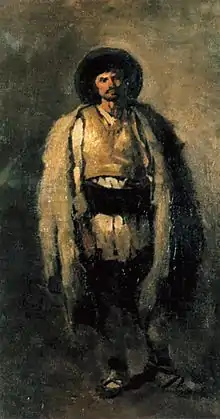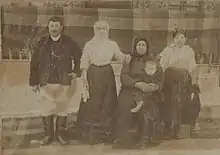

The Mocani (SG Mocan), sometimes referred to as Mocans in English,[1] are an ethnic Romanian subgroup composed by shepherds from Transylvania traditionally practicing transhumance between southern Transylvania and the region of Dobruja.[2][3]
A large number of Mocani left the Habsburg monarchy to escape the oppression they were subjected to in their homeland and settled permanently in Dobruja, a region then under the Ottoman Empire where they had more freedom and could own more land. This region was then multiethnic, composed of native ethnic Romanians but also of many other peoples such as Turks or Tartars. Following the integration of Northern Dobruja into Romania in 1878, more Mocani migrated to the region. This phenomenon had an effect on the local Romanian dialects, which adopted many words typically belonging to the Transylvanian varieties of Romanian.[4]
See also
- Gugulani
- Momârlani
References
- ↑ Tușa, Enache (2014). "Traditions, identity and social institutions in Dobrogea (1880–1920)". Annals of the "Ovidius" University of Constanța – Political Science Series. 3 (1): 7–24.
- ↑ Deteșan, Daniela; Cosma, Ela (2016). "Ethnicity, nationality, and statistics. The Romanians from the Habsburg Empire, the Ottoman Empire, and the Tsarist Empire (1848–1850)". Romanian Journal of Population Studies. 10 (2): 119–136.
- ↑ Dumitrașcu, Lavinia (2 May 2018). "Mocanii care au devenit mari proprietari, crescători de animale, comercianți, "industriași", dezvoltând Dobrogea". Ziua de Constanța (in Romanian).
- ↑ Iancu, Mariana (25 June 2017). "Povestea mocanilor dobrogeni, ardelenii care au fugit de austro-ungari ca să fie liberi sub stăpânirea turcă. "Li s-a spus că pot să ia atâta pământ cât pot să lucreze"". Adevărul (in Romanian).